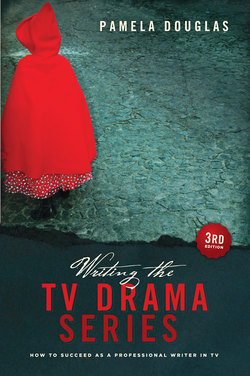Читать книгу Writing the TV Drama Series 3rd edition - Pamela Douglas - Страница 9
На сайте Литреса книга снята с продажи.
ОглавлениеWHAT’S NEW IN THIS EDITION
If you’re familiar with the Second Edition, you’ll notice how much has been updated. Though the chapters on craft present the same essential principles, small changes occur throughout, replacing older shows with current ones and considering the Internet and new platforms in all subjects.
Among the larger changes, the book has gone from seven chapters to eight. The final chapter that was a brief treatment of new outlets in the Second Edition is now a full chapter dealing with the future of TV drama on the Internet, the impact of new delivery potentials on writers, and an international perspective. Since the book has become global, I thought that expansion would be significant.
Entirely new “Spotlight” sections include one on “Dramedy” and one on “Unscripted/Reality TV.” Also the “Procedurals” section is more comprehensive and now includes House and The Good Wife as well as CSI. The Pilot section has been amplified as well.
Among the fresh interviews, I’m especially proud of landing one with Charlie Collier, the President of AMC Cable TV. I never had a network president in the book before, but the rise of basic cable as a phenomenon made this relevant. Other new interviews include: David Isaacs (M*A*S*H, Mad Men), Michelle and Robert King (The Good Wife), David Simon (The Wire), and others. In the Reality segment I have a candid interview with a Reality producer, and other writer-producers have been quoted throughout.
I re-interviewed Steven Bochco, and edited his earlier interview to blend with this one. I also re-interviewed my former students, creating a unique longitudinal study of what happens to film students in the 14 years after they graduate.
To make room for all these enhancements, I had to edit out some interesting material from the Second Edition. Interviews with the producers of Lost, Battlestar Galactica and Deadwood are gone, as is the blogging chapter on Grey’s Anatomy. Instead, I incorporated portions of those in other chapters. You can access the full deleted interviews in the Archives section of my website www.PamDouglasBooks.com.
My motivations for working so hard on this Third Edition are partly in response to how much television is evolving, and partly in response to the respect with which this book has been met, for which I’m grateful. Not only has it been recognized as the premiere book on the subject worldwide, but I’ve discovered that it has two distinct readerships. The main one, of course, is people who hope to become writers, both students and the general public. But we’re gradually accruing a second audience: people reading for insights into contemporary media. For example, Critical Studies scholars and Communications analysts have been referring to this book, and my interviews (including those for the international translations) have asked more about the nature of dramatic television than about how to break in or how to write a scene. That’s a little different from a few years ago. I wanted this new edition to be truly comprehensive in order to keep its mantle as THE book on this subject.
